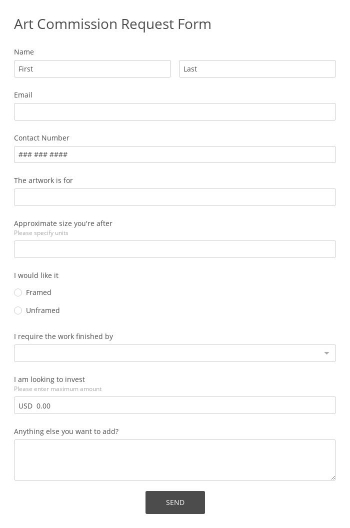More Templates
Looking for a different template?
- Art Commission Request Form
- Art Submission Form
- Artwork Request Form
- Construction Change Order Form
- Fixed Asset Disposal Form
- Inventory Disposal Form
- Inventory Request Form
- Item Request Form
- Product Development Form
- Product Inventory Form
- Production Schedule Form
- Proof Approval Form
- Quality Control Form
- Site Inspection Form
- Waste Transfer Form
- Work Order Request Form
Manufacturing Forms Templates
Web-based manufacturing forms provide a distinct advantage for businesses by streamlining production processes. These digital forms enhance data accuracy, real-time information access, and workflow efficiency. They minimize errors, reduce paperwork, and ensure timely decision-making. With the ability to capture and manage data electronically, manufacturing companies can achieve higher levels of productivity, quality control, and cost-effectiveness, giving them a competitive edge in the industry.

Data collection is a pivotal aspect of modern manufacturing. Manufacturers increasingly rely on data to enhance their operations, achieve efficiency, and remain competitive. In this article, we delve into the reasons why collecting data is so crucial for manufacturers and how tools like E-FormBuilder's web-based hosted solutions are reshaping data collection in the manufacturing industry.
Data Visibility:
Data collection provides manufacturers with unparalleled visibility into their production processes. From raw materials to finished products, every step of manufacturing can be monitored and analyzed. This visibility empowers manufacturers to make informed decisions, optimize workflows, and identify areas for improvement.
Shop Floor Data Collection:
Shop floor data is the lifeblood of manufacturing. It encompasses information related to machine performance, product quality, employee productivity, and production schedules. By collecting and analyzing this data, manufacturers can detect issues in real-time, ensure consistent product quality, and maintain efficient production schedules.
Measurement, Understanding, and Optimization:
Data collection enables manufacturers to measure, understand, and optimize their production processes. Through data analysis, patterns and trends emerge, shedding light on areas that require attention or improvement. Manufacturers can use this insight to enhance production efficiency, reduce costs, and deliver higher-quality products.
Improved Reaction Times:
Timely response to issues or changes in production is essential. Data collection in real-time allows manufacturers to react swiftly to unexpected events or deviations from production standards. This agility can prevent costly delays, reduce downtime, and help manufacturers meet production targets and customer demands effectively.
E-FormBuilder's Web-Based Hosted Solutions:
Traditional development of data collection forms can be resource-intensive and time-consuming. E-FormBuilder offers a cost-effective and efficient alternative. With web-based hosted solutions, manufacturers gain access to pre-built templates and an intuitive drag-and-drop editor for form creation. This approach reduces development costs and accelerates the form design process significantly.
Furthermore, E-FormBuilder's hosted solutions enable rapid deployment of forms across the organization. Forms can be accessed on various devices, ensuring seamless and accurate data collection on the shop floor. Real-time data access and secure storage are also key features, providing manufacturers with the tools they need to make data-driven decisions and optimize production processes effectively.
Data collection is indispensable for modern manufacturers aiming to thrive in a competitive landscape. It offers visibility, insights, and the means to measure, understand, and optimize production processes. E-FormBuilder's web-based hosted solutions provide an efficient and cost-effective approach to data collection, saving time and money while empowering manufacturers to make informed decisions and respond rapidly to evolving challenges in the manufacturing industry.
Get Started Now